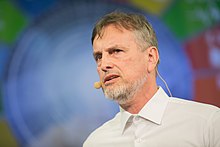Jürgen Schmidhuber
Jürgen Schmidhuber (born January 17, 1963 in Munich ) is a German computer scientist . Since 1995 he has been scientific director at IDSIA , a Swiss research institute for artificial intelligence .
life and work
Schmidhuber studied computer science and mathematics at the Technical University of Munich from 1983 , where he obtained his diploma in 1987 and received his doctorate in computer science under Wilfried Brauer in 1991 ( Dynamic Neural Nets and the Fundamental Spatio-Temporal Credit Assignment Problem ). As a post-doctoral student he was at the University of Colorado Boulder in 1991/92 . In 1993 Schmidhuber completed his habilitation at the Technical University of Munich ( Net Architectures, Objective Functions, and Chain Rule ). He was senior assistant and from 1995 private lecturer at the Technical University of Munich, before becoming scientific director of IDSIA in Lugano in 1995.
He has been professor at the Scuola universitaria professionale della Svizzera italiana in Manno since 2003 and a full professor at the University of Lugano since 2009. He was also head of the laboratory for cognitive robotics at the Technical University of Munich from 2004 to 2009 as associate professor.
He has published numerous scientific articles in the following areas: machine learning , neural networks , Kolmogorow complexity , digital physics , robotics , barely complex art and the theory of beauty .
The recurrent neural networks (RNN) developed in his working group efficiently learn some tasks that were once impossible to learn: recognition of certain context-sensitive languages, robot control in partially visible environments, music composition, aspects of language processing, recognition of handwriting. Starting in 2009, he received various prizes in visual pattern recognition competitions for machine learning and artificial intelligence with his neural networks. They were used, for example, in Google's AI research, for example on the game of Go ( AlphaGo in Deep Mind). One of the founders of Google DeepMind studied with Schmidhuber in Lugano. The RNN were improved in particular by an idea of Schmidhuber's graduate student at the Technical University of Munich Sepp Hochreiter (Professor in Linz) in 1991, the implementation of long short-term memory (LSTM) in the neural network, which enabled it to look back into the past while learning . Schmidhuber describes his RNN with LSTM as deep learning networks.
His possibly most ambitious work is the Gödel machine (2003) for solving any problem that can be formalized. With the help of an asymptotically optimal theorem prover, the Gödel machine overwrites any part of its software (including the theorem prover) as soon as it has found evidence that this will improve its future performance.
Schmidhuber also published works on the set of possible computable universes. His “great programmer” implements Konrad Zuse's hypothesis (1967) of digital physics , against which there is no physical evidence to date. In 1997 Schmidhuber pointed out that the simplest program calculates all universes, not just ours. A contribution from 2000 also analyzed the set of all universes with limit-calculable probabilities as well as the limits of formal describability.
This work led him to generalizations of the Kolmogorov complexity K (x) of a bit string x. K (x) is the length of the shortest program that computes and holds x. Schmidhuber's non-stopping, yet converging programs represent even shorter, namely the shortest possible formal descriptions. They lead to non-countable, yet limit-calculable probability measures and to so-called super-omegas, which are generalizations of Gregory Chaitin's “Number of all mathematical wisdom “ Omega acts. All of this has consequences for the problem of optimal inductive inference, i.e. that is, the optimal future forecast from data observed so far.
In 2013 Schmidhuber received the Helmholtz Award from the International Neural Networks Society, in 2016 the IEEE CIS Neural Networks Pioneer Award, and his laboratory received the NVIDIA Pioneers of AI Research Award in 2016.
As a consequence of the inevitable progressive automation and the associated loss of gainful employment, Schmidhuber sees the need for an unconditional basic income : “Robot owners will have to pay taxes in order to feed the members of our society who no longer do existentially necessary jobs. Anyone who does not support this to a certain extent invokes the human versus machine revolution. ”( Jürgen Schmidhuber : We have to raise robots like children. Interview by Vinzenz Greiner, January 15, 2017.)
Fonts (selection)
- Deep learning in neural networks: An overview. In: Neural Networks. 61, 2015, p. 85, arxiv : 1404.7828 [cs.NE] .
Film documentaries
- 3sat Kulturzeit: Interview with Jürgen Schmidhuber, 2016
- Lecture by Jürgen Schmidhuber: Artificial intelligence will change everything, 2016
- Juergen Schmidhuber: Godel Machines, Meta-Learning, and LSTMs on YouTube , from December 23, 2018
literature
- Roman Leipold: Like a bolt of lightning in world history (AI series, part 3). Chip, 2016, No. 4 ( PDF ).
Web links
- Schmidhuber's website
- Literature by and about Jürgen Schmidhuber in the catalog of the German National Library
- Intelligent robots will be fascinated by life. In: FAZ.net . December 1, 2015, accessed April 29, 2017 .
- Richard David Precht in conversation with Prof. Jürgen Schmidhuber: Artificial intelligence - rule of machines? In: ZDFmediathek . October 20, 2019, accessed October 24, 2019 .
Individual evidence
- ^ Schmidhuber on Hochreiter's contribution
- ^ Schmidhuber, My First Deep Learning System of 1991 + Deep Learning Timeline 1960–2013
- ^ Press agency APA / sda: Robot researcher advocates unconditional basic income In: diepresse.com , January 15, 2017. Accessed April 7, 2017.
| personal data | |
|---|---|
| SURNAME | Schmidhuber, Jürgen |
| BRIEF DESCRIPTION | German computer scientist |
| DATE OF BIRTH | 17th January 1963 |
| PLACE OF BIRTH | Munich |
